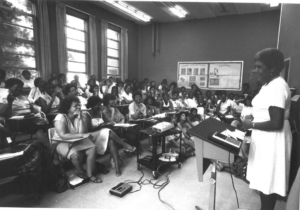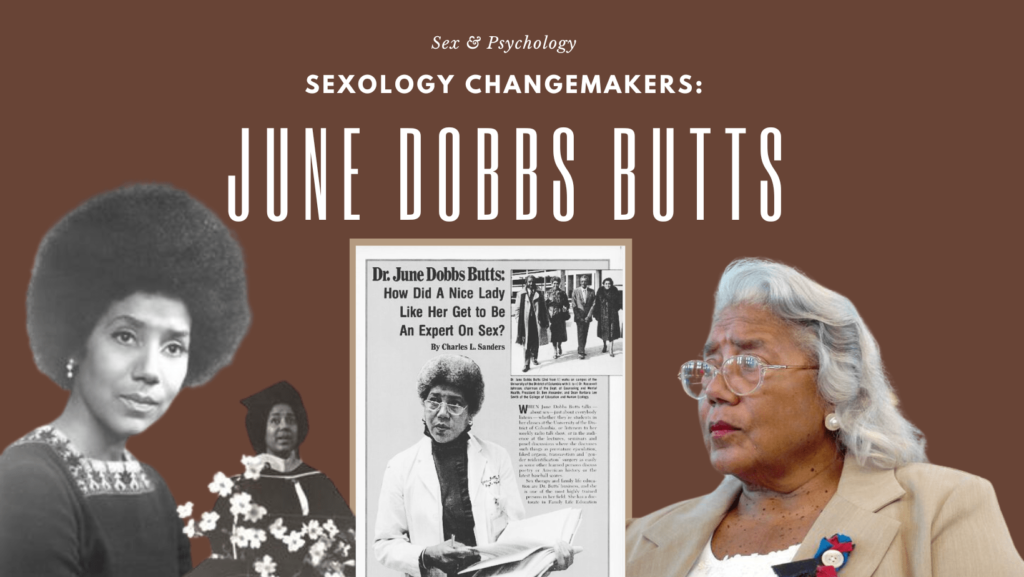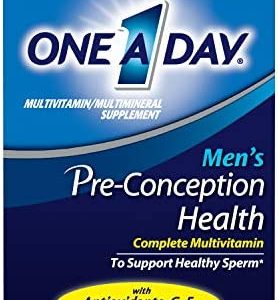In the annals of sex research, there are many unsung heroes whose contributions have shaped our understandings and practices related to sexuality today. Among them stands Dr. June Dobbs Butts, a pioneering figure whose work left an indelible mark on the field of sexology. In fact, Wednesday Martin argued that Dr. Butt’s research held equal significance to that of Masters and Johnson and Alfred Kinsey. She may have been the foremost sex researcher to focus on exploring the sexual experiences of Black Americans, and she also played a pioneering role in bringing sex research into broader public awareness. From her advocacy for reproductive health to her holistic approach to sex therapy, Butts will remain a beacon of inspiration for generations to come.
At Sex and Psychology, we have been highlighting some of the “hidden figures” in sex research that you may not have heard of. For example, see our previous blogs that have illuminated the important work of Shere Hite who surveyed over 3000 women about sex and masturbation in the 1970s and Virginia Johnson who is perhaps most well-known for her work in some of the most foundational studies and publications in sex research with William Masters. This week, we will be focusing on Dr. June Dobbs Butts.
Life and Education
June Dobbs Butt was a therapist, family counselor, researcher, professor, and one of the first African American Sexologists. Born in Atlanta, Georgia, in 1928, she was raised in a family deeply committed to social activism and community service [1, 2]. Her parents were Irene and John Wesley Dobbs, one of Atlanta’s most prominent African American leaders before the civil rights movement [2]. These formative influences instilled in Butts a sense of duty towards advocating for marginalized communities.
Butts pursued her education with fervor, earning a Bachelor of Arts in sociology from Spelman College in 1948 and a Master of Science in social work from Atlanta University in 1949 [1]. The family set a record with June and her five sisters all graduating from the same college. After her graduation, she worked with her friend Dr. Martin Luther King, Jr., who she fondly referred to as M.L. The two worked together as paid interviewers supporting a study of a professor they knew at the time. She returned to graduate school after raising her children, earning her doctorate degree from Columbia in 1969 in family life education [1]. Her academic pursuits laid the foundation for her lifelong dedication to addressing societal inequalities, particularly in the realm of public health.
Dr. Butts initiated her academic career in 1950 by joining the psychology department at Fisk University as a professor. Later in her career she worked at Tennessee State University, Howard University College of Medicine, and Meharry Medical College [2]. Throughout her career she published several journal articles, book chapters, and magazine articles primarily focused on sexuality in the Black community.
Sex Therapy
During her time volunteering on the Board of Directors of Planned Parenthood in the 1970s, Dr. Butts crossed paths with renowned sex researchers, Masters and Johnson. They extended an invitation for her to join their team at the Reproductive Biology Research Foundation (later known as the Masters and Johnson Institute) in St. Louis, Missouri. It was there that Butts became the first African American to undergo training as a sex therapist under the guidance of Masters and Johnson [1, 2]. She spent a several years there as a therapist. Subsequently, she held a position as a visiting scientist at the CDC (Centers for Disease Control & Prevention) in Atlanta [3].
Dr. Butts emerged as a prominent and indispensable figure for advocating for the sexual needs and health of Black women, particularly in an era where there was traditional and sometimes religion-influenced hesitancy to openly engage in discussions about sexual topics in general [1]. Butts spearheaded initiatives to empower Black women to take control of their reproductive health. Specifically, she advocated for the open discussion of often taboo topics like masturbation, bisexuality, and transgender issues.
Butts was a firm believer that to understand sex and to help clients with their sexual difficulties, therapists need to take a holistic approach rather than just focusing on physiology and physical performance alone. When discussing common sexual complications experienced by her clients, Dr. Butts said, “I don’t see things just that clinically. I’m much more social and interpersonal.” She went on to say that couples often reported that the physical act of sex was fine, but where they struggled was related to other issues like money, children, power imbalances, or understanding each other’s sexual desires and fantasies [1].
Publications
Dr. Butts has left us with an invaluable message about the importance of sexual wellbeing and health for all. She wrote a number of book chapters and articles in popular magazines [2]. Notably, she wrote Ebony magazine’s inaugural feature on human sexuality titled “Sex Education: Who Needs It?,” which debuted in 1977. In other work, she encouraged young Black adults to have conversations about their sexuality, wherein she discussed how these conversations can empower couples to understand one another and create an environment that fosters open and honest sexual communication [4].
Legacy and Impact
June Dobbs Butts’ legacy endures as a testament to the power of advocacy and activism in advancing sexual health and social justice. Through her pioneering efforts, she challenged entrenched inequities and transformed the landscape of sexual health and wellbeing, especially for women of color.
As we reflect on Butts’ contributions, we are reminded of the ongoing struggle for health equity and social justice. Her legacy serves as a guiding light for those who continue to fight for the rights and dignity of all individuals, regardless of race, gender, or socioeconomic status.
Conclusion
While her name may not be widely known, we owe a tremendous debt of gratitude to this trailblazer for her ground-breaking work in normalizing female sexuality, particularly within the Black community. Butts left an indelible mark on the fabric of American sexology. As we celebrate her legacy, let us heed her call to action and continue the work of building a more just and equitable world for future generations.
References
- June Dobbs Butts, pioneer work on sex therapy’s New Frontier – The Washington Post. (1980). https://www.washingtonpost.com/archive/local/1980/10/09/june-dobbs-butts-pioneer-work-on-sex-therapys-new-frontier/7db54898-4411-45a8-9035-19b7543db4ff/
- June Dobbs Butts. The History Makers. (2006). https://www.thehistorymakers.org/biography/june-dobbs-butts-41#:~:text=Butts%20authored%20four%20book%20chapters,which%20was%20published%20in%201977.
- Spelman College Celebrates the Life and Legacy of Dr. June Dobbs Butts. Spelman College. (2019). https://www.spelman.edu/about-us/news-and-events/our-stories/stories/2019/06/10/june-dobbs-butts
- Butts, J. D. (1991). Sex And The Modern Black Couple. In Ebony (Vol. 46, Issue 4, pp. 128-). Johnson Pub. Co., etc.
Image credits: CUNY SPH; collage made by Emily Mendelson
Want to learn more about Sex and Psychology? Click here for more from the blog or here to listen to the podcast. Follow Sex and Psychology on Facebook, Twitter (@JustinLehmiller), or Reddit to receive updates. You can also follow Dr. Lehmiller on YouTube and Instagram.
The post Sexology Changemakers: Dr. June Dobbs Butts appeared first on Sex and Psychology.
[ad_2]
Article link
-
Virility Supplements
ONE A DAY Men’s Pre-Conception Health Multivitamin to Support Healthy Sperm
$14.99




